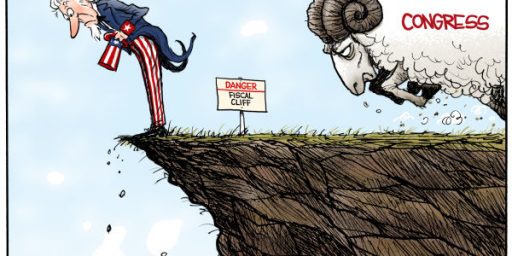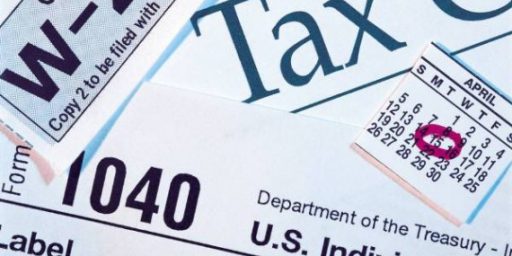More Tax Brackets!
Matt Yglesias discovers that some people make a whole lot of money and stumbles on a novel idea.
Why not more brackets with slightly higher rates at $450,000 and $550,000 and $650,000 and so on and so forth up the spectrum? People who start earning this kind of big-time CEO money would, I think, almost literally not miss the money.
I doubt it very much that the government’s taking half or more of a very large amount of money would go unnoticed.
We had tax brackets as high as 90 percent until John Kennedy led an effort to cut them. The top bracket was upwards of 70 percent when Ronald Reagan took office and led an effort to cut them. Both efforts were good for both the general economy and for tax revenues. I’m not one who believes that we should continue chipping away at rates indefinitely on the basis that doing so will actually bring in more revenue. There’s a point where diminishing returns kick in, although I won’t claim to know precisely where it us.
Some progressivity in the tax system is necessary to run a government as big as the citizenry have collectively demanded. A truly flat system generating that much revenue would simply take too large a share of the income of those on the bottom. (One could still have a flat nominal rate but generous standard deductions.) But, at some point, it becomes punitive.
Beyond that, though, a more fundamental question exists: How much of a claim on people’s earnings does the state have? The top bracket, which kicks in for individuals or couples at $372,950, is 35 percent. Over a third right off the top. Why isn’t that enough?






Because if you make ten million dollars you will take home a paltry 6.5 mill. And if you are only making your ten million through investments then you only take home a pittance of 8.5 million.
But, either way, it’s your money that you earned, not the government’s. And whether capital gains should be taxed as regular income is a separate question from what the top rate should be for income.
James, I really think the questions you ask are rhetorical and that some of the comments on the site don’t get the vibe, probably because they haven’t read you for a long enough time. Setting that aside, you ask:
For people who believe that government has the answer to every problem that society faces, no amount is ever enough. It is the most uncreative thesis of the Left: that throwing money creatively at a situation, collected at gunpoint from the most productive members of society, is the solution to any problem.
“How much of a claim on people’s earnings does the state have?”
The same question I ultimately ask people when I find myself in tax debates. Its obviously a baiting question. I generally get responses ranging from 10% to 25%, even from tax the rich zealots. When I inform them that under the current code more than 25% is paid by upper income people they usually start mumbling something about loopholes.
The fact of the matter is that most people balk above 25% out of some intutive sense of fairness. (Unlike King Raoul, who would apparently take just about all of it if he could.) Unfortunately, most people just don’t know the facts.
If people really knew what fraction of their gross income can actually be converted into consumable goods and services after fed/state/local income taxes, property taxes, gas taxes, fees etc ect they would be stunned.
And here’s one people often don’t consider. Even after you think you have “paid” your tax bill, when you go to buy goods and services with your “after tax dollars” you pay some more: sales taxes (as high as 10% in good old Cook County IL, and not to mention those interesting add on taxes for hotels, rental cars, dining out etc) Consider that in the context of spending, say, 95% of your income, and saving only 5%.
Every million made by billionaires is made primarily as a context of being in a society. One approach would be to maximize tax rate- in that sense we are way too low- but no, I do not agree with that- in fact I really do not have a preferred method of distribution. But I know this: current federal government expenditures amount to 20% and rising- thus we need a mechanism that provides as much through payroll taxes, corporate taxes, income taxes, excise taxes. As to income taxes: the rate among millionaire earners needs to be increased to keep up with government expenses- either that or get rid of health care to older Americans, defensive expenditures, safety nets and infrastructure (highways, airports, etc.)-and we have not even touch interest on the debt- who pays that? So – it really is a matter of reality- either cut services that most Americans want (and good luck with that) or increase revenues- both cannot co-exist and if it continues in the long run- the billionaires assets will be worth zilch.
Jay C — Nice straw man.
It will never be enough because it’s not about how much you have or the government takes for Young Mr. Yglesias. It is about achieving his nebulous concept of equality of outcome, where we all toil for the greatest good for the greatest number. Fom each according to his ability, to each according to his need.
As for Raoul’s shortsightedness, do you not believe that people other than the millionaires benefited from the trades or purchases that resulted in them making millions? And I know you won’t agree, but many of us believe the cutting of “services” as you call them is what is needed. The ever increasing percentage of taxes taken, or spent regardless of takings, will be the death of the republic. Even Plato knew this.
Rethorically speaking, what you lack here is a socialists perspective, instead clinging to the now outdated concept of private property, and the concept that people have a moral right to what they produce by the sweat of their brow…(Not idly chosen wording)
Everything must be sacrificed for the state. Eveything is already the property of the state, to dispose of as THEY see fit.
charles austin — Straw man argument #2
Bithead — #3
We’re on a roll folks.
I’d be interested in your entertaining us with your attempt to explain how what I said constitutes a straw man argument.
James,
“Both efforts were good for both the general economy and for tax revenues.”
On Kennedy, this is correct. On Reagan, it was not as far as tax revenues went. That’s why Reagan had to raise taxes in nearly every year after his 1981 tax cuts.
“The top bracket, which kicks in for individuals or couples at $372,950, is 35 percent. Over a third right off the top. Why isn’t that enough?”
Last time I looked, we live in a democracy. If we, through our elected representatives, decide to spend roughly 20% of GDP on government services, either we need to raise the taxes to pay for them, or we run deficits and let our children pay for them. Republican governance for the last few decades has meant some combination of (i) cut taxes, and maybe someday we’ll cut spending or (ii) deficits don’t matter. And yet, they have the unmitigated gall to call themselves the party of fiscal responsibility with something approaching a straight face.
It’s not over a third right off the top.
Scott: if you want to call me out on a straw man, it’s because having known James’ blogging for a while, I get the feel that a question like that is more for us discussing amongst ourselves that to answer his question.
Want my idea? The government has “no claim” over a person’s income. The operating costs of a government, which in theory has to be within budget, is consented to by the populace. Personally I think that people have become too complacent in allowing state and federal governments too large of a role, and thus have “consented” through convenience to way too much money.
I’m a “goverment builds the roads and defends the nation” kind of guy. I think that we are on the wrong side of the peak point of the Laffer curve and that the best way to cut taxes is to cut spending.
I hope that’s not too straw-y for your taste.
Bithead — Your post in its entirety is a classic straw man argument. Ynglesias proposed more tax brackets (for the record, I oppose). You then, instead of responding to his proposal created a separate, fictitious argument which you instead dealt with.
Did Ynglesias say anything like, “outdated concept of private property”? No, you did for the sake of your own argument.
Did Ynglesias oppose, “right to what they produce”? No, you did for the sake of your own argument.
Did Ynglesias propose that, “Everything must be sacrificed for the state.” Again, no, you did.
Likewise, “Eveything is already the property of the state.”
I point of fact, did anyone push these issues? No, they were constructed by you because they are easy to tear apart. That is a textbook Straw Man argument.
http://en.wikipedia.org/wiki/Straw_man
Scott Swank might call it a straw man, but the reality is that Yglesias is debating how much of a person’s income that person should be allowed to keep. Swank’s lack of willingness to discuss it as such doesn’t make it a straw man.
As far as the claim “People who start earning this kind of big-time CEO money would, I think, almost literally not miss the money” is concerned…well I wouldn’t miss my appendix if a competent surgeon barged into my house and took it from me (backed by 51% of the populace, of course), but that doesn’t mean it’s not assault.
Jay C — Fair points, all of them. And not straw man arguments. While you may not like tax rates of up to 35%, you are in disagreement with the vast majority of economists when you state that we are on the right side of the Laffer curve.
No, I responded to a point made by James. I even quoted James when I responded to him. Clearly, your reading skills aren’t up to the drill. More…
Correct.
The first falsity in your argument, Raoul, is that government services (expenditures) cannot be reduced. That is simply laughable.
But second, you hide behind the notion that Americans “want” these services, and therefore we must pay whatever government needs, based upon the vote. Well, Americans “want” what is packaged by slick politicians as “free” services that OTHER people pay for. In other words, they buy into snake oil. Snake oil is not reality.
Taxing all the income and wealth of the super rich could only keep the government going for a few days. Therefore, of necessity, tax financing of government expenditures digs deep down into the income strata. If properly characterized, Americans wouldn’t “demand” these services. They vote for a concept, not reality.
Further, as a thought experiment, let’s deal with your “they have enough” concept. Recent tax rhetoric had “the rich” pegged at about $200K income a year. Let’s just suppose we pass tax legislation that says – ALL of your income is taxed away, until your after tax is reduced to that of a $200K/year earner, so that the non-rich do not suffer any increased tax burden until that test is met, and “the rich” – who have enough, after all – are on equal after tax basis.
Imagine all those movie stars, rock stars, rappers, TV stars, rich liberals, TV news anchors……all those people who support Democrats and their tax proposals have to make good on their views: we’ve got enough, so until the non-rich have a tax burden, we’ll give our income in.
Good bye private jets. Good bye Malibu homes. Good buy Hollywood parties.. Good buy Nantucket summers…………..snicker
Hello Republican majority.
Argue, if you want, for some marginal progressivity. But cut the “they have enough crap.”
Addendum: NOte also, please, where James labels this added point, corectly, as the more fundamental question. That issue, Swank, is at the heart of all the rest of it,a nd needs be addressed before ANY of the rest of it.
The argument over the state’s right to take my income at it’s will, is clearly over, in the mind of Yglesias… a point I’ve noted before, both here and at my own place and a that’s a central point of my friction with the man… his refusal to acknowldge the larger issues involved here. Far as Yglesias is concerned, the argument is over and the state won. However, not for me. And it appears I’m not alone.
15% debt by definition cannot be reduced- DOD can certainly be reduced but not as much as some think-Medicare can only be altered with a structural change in health care in the country-On and on- in fact current modern history suggests that the USA is among the leanest governments in the first world-sorry- there is little to cut- and as soon as we do people die (peanuts anyone)-instead of going on a gallery of horribles- what we should strive is to find a balance-individuals who voted GOP and “drown the government in a bathtub” mentality were not proposing earnests solutions and were denying reality-a tendency still much alive.
Wait, you mean the below isn’t in the U.S. Constitution?
James, I think Yglesias had a good point in there, though – why is the top bracket set at $331,000? That lumps in the upper end of the Middle Class with the super-rich, like lumping in Bill Gates with a doctor or particularly good lawyer.
If you had more brackets (and these are marginal brackets, so only the income made above that point is taxed at that rate), you could spread the progessive system out more. Maybe people making $350,000 a year would only have marginal rate of 30% compared to the current 35% – but there would be a higher bracket at $1 million (indexed to inflation) with a marginal rate of 40%. It’s not as if this would be a new thing, either; if I recall correctly, the top income tax bracket in Eisenhower times would, in real income indexed to inflation, equate to incomes of about $5 million and up.
I don’t see you objecting to that process when it is done for the purpose of National Defense, or adequate police forces, or the Center for Disease Control.
From what I’ve actually read and heard, 47% seems to be the magic number. Beyond that, people’s incentives to earn more income start showing serious reductions.
Exactly. The 16th Amendment, achieved by constitutionally legal means (and with broad support at the time, it should be noted), is as much a part of the Constitution as the right to free speech, and so forth. If you have a problem with that, sponsor a constitutional amendment to repeal the 16th Amendment.
O.K Gentlemen, I know that some of you are not going to like reading this but here are the facts:
1) 53.25% of all taxes are paid by the top 3% of wage earners
2) 64.89% of all taxes are paid by the top 10% of wage earners
3) 96.03% of all taxes are paid by the top 50% of wage earners
It looks pretty clear here to me that the wealthy are paying their fair share.
Thank You